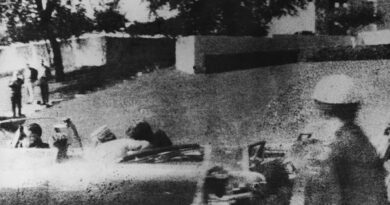The Humor in the J.F.K. Conspiracy
“You’re using this conspiracy theory as an excuse to avoid sex with me.” There’s plenty to choose from, but this is one of the better lines from “Annie Hall,” delivered to Woody Allen’s Alvy Singer character at the breaking point of a failed relationship:
The scene is a flashback to a time when many Americans were obsessed with the official explanation of the Kennedy assassination, as delivered by the Warren Commission, which published its report in book form in September, 1964, much the way that, decades later, the Starr Report was bound and delivered to bookstores. Television news programs were dedicated to parsing its findings, namely that Oswald had acted alone. But, of course, not everyone was convinced. By 1977, when “Annie Hall” was released, the suspicions mentioned in this scene had been fully absorbed into the culture—concerns about bullet trajectory and exit wounds and second shooters and Cubans and Johnson and the mob. It is a perfect kernel of character development: of course the anxious Alvy Singer was a conspiracy kook. His fear of moths helped ruined one relationship, why shouldn’t worries about a Kennedy coverup have ruined another?
If the official version of Kennedy’s assassination is true, there’s nothing funny about it. But a conspiracy might be. In 1991, the Oliver Stone movie “JFK” helped renew the spring of fascination about the murder and the lingering questions that have trailed it. A year later, an episode of “Seinfeld” transformed Stone’s so-called magic bullet into a “magic loogie,” one that had supposedly been spit at Kramer and Newman by the Mets first baseman Keith Hernandez:
This scene is a parody of the movie, but it is also a joke about the ways in which, in the years after Kennedy’s death, so many people became versed in details of forensics, physics, and amateur cinematography—and also able to consider these particulars at a distance from the emotional realities of the assassination. The brute facts of the killing, filtered through the lasting obsessiveness that they’ve inspired, had become funny unto themselves—as the late New Yorker cartoonist Leo Cullum showed in 1994:
There is something darkly comedic, and readily mockable, about the conspiracy theorist considered as a type: the lonerism, eager dot-connecting, and thinly-veiled death curiosity masked by a supposed quest for the truth. (Mark Lane, the author of “Rush to Judgment,” who toured talk shows in the sixties wearing bulky black glasses, may be the ur-Conspiracy Man of the Kennedy case.) Richard Linklater’s movie “Slacker,” from 1991, gives us another hero of the genre, the Austin, Texas, resident John Slate, author of the not-likely forthcoming book about the assassination, “Conspiracy-A-Go-Go” (or “Profiles in Cowardice”):
But can the conspiracy theorist himself be funny? The comedian Bill Hicks, who died in 1994, could make you laugh about the assassination, even if you didn’t agree with his basic assertion that Oswald couldn’t have shot the President from his perch in the Texas School Book Depository building. In one standup bit, he talks about that spot, which later became a museum to the killing: “They have the window set up to look exactly like it did on that day. And it’s really accurate, you know, because Oswald’s not in it.” For Hicks, the assassination connects to his deeper suspicions about coercion and control by a powerful few over the confused masses—or, as he puts it about the official explanation: “We have figured it out. Go back to bed, America, your government has figured out how it all transpired. Go back to bed, America, your government is in control again.” Conspiracies are alluring, even to those disinclined to believe them, because they give voice to our suspicions and fears about government power and dark forces beyond our control. It can be cathartic to consider the worst possible scenarios that the uncertainty about Kennedy assassination suggests—and, faced with those, it makes as much sense as anything to laugh.
Hicks was influenced by the progressive political comedy of George Carlin, who also pointed out ways that powerful business interests controlled politics, along with most other facets of our lives. In the early sixties, Carlin, back in his suit-and-tie days, did a pretty good John Kennedy impression, adding “R”s to the ends of both “Vienna” and “Austria,” and nicely mangling Khrushchev’s name. Much later, Carlin performed a bit about the motives behind our most notorious public killings:
*** This article has been archived for your research. The original version from The New Yorker can be found here ***



